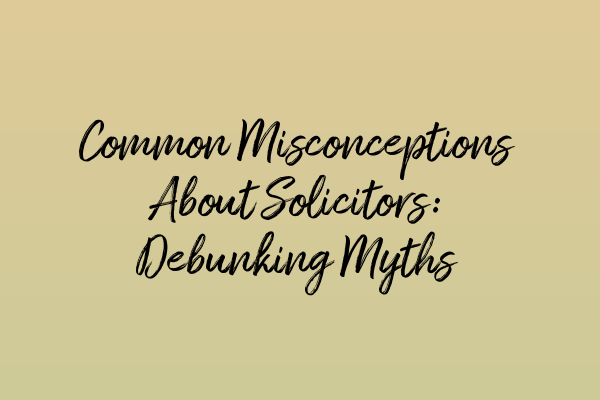Common Misconceptions About Solicitors: Debunking Myths
As a solicitor, I often come across various misconceptions and myths about my profession. These misunderstandings can lead to confusion and misinterpretation of the role of a solicitor in the legal system. In this blog post, I aim to debunk some of these common misconceptions and provide a clearer understanding of what a solicitor does.
Misconception 1: Solicitors only handle criminal cases.
One of the most prevalent myths about solicitors is that they only deal with criminal cases. While criminal law is certainly a significant area of practice, solicitors are involved in a wide range of legal matters. They can help individuals and businesses with family law issues, property matters, corporate law, intellectual property concerns, and more. The legal expertise of a solicitor extends far beyond the criminal justice system.
Misconception 2: Solicitors are just glorified legal advisors.
Another misconception is that solicitors are merely legal advisors who provide guidance and assistance. While solicitors do offer legal advice, their role goes much further. They actively represent clients in court, negotiate settlements, draft legal documents, and provide comprehensive legal representation. Solicitors have a broad skill set that encompasses both advisory and advocacy roles.
Misconception 3: Solicitors are expensive and only for the wealthy.
Contrary to popular belief, solicitors are not exclusively for the wealthy. There is a misconception that solicitors charge exorbitant fees, making their services unaffordable for the average person. However, solicitors work on a variety of fee structures, including competitive hourly rates and fixed fees for specific tasks. Additionally, many solicitors offer free initial consultations, allowing individuals to seek legal advice without incurring any upfront costs.
Misconception 4: Solicitors are only needed when a problem arises.
Another misconception is that solicitors are only necessary when a legal issue arises. While solicitors can certainly help resolve legal problems, their role extends beyond that. They can provide proactive legal advice to individuals and businesses, assisting in avoiding disputes and ensuring compliance with relevant laws and regulations. Seeking legal counsel before a problem arises can help mitigate risks and prevent potential legal complications.
Misconception 5: Solicitors are impersonal and lack empathy.
Some people believe that solicitors are aloof, robotic individuals who lack empathy for their clients’ situations. This could not be further from the truth. Solicitors are trained professionals who genuinely care about their clients and their legal matters. They understand the emotional nature of many legal issues and strive to provide compassionate and personalized representation. Building strong client relationships and empathizing with their concerns are essential aspects of a solicitor’s role.
Misconception 6: Solicitors are overwhelmed and unresponsive.
There is a misconception that solicitors are always too busy to respond promptly to their clients’ queries and concerns. While the legal profession can indeed be challenging and demanding, solicitors understand the importance of communication and staying accessible to their clients. Many solicitors have systems in place to ensure timely responses and prioritize effective client communication.
In conclusion, it is crucial to separate fact from fiction when it comes to understanding solicitors and their role within the legal system. They are not limited to criminal cases and provide a wide range of legal services to individuals and businesses. Solicitors are not just legal advisors but also skilled advocates who actively represent their clients. They offer affordable options and are not exclusively for the wealthy. Moreover, solicitors are empathetic professionals who care about their clients’ needs and work diligently to provide effective representation.
If you have any legal concerns or would like to explore related topics further, I encourage you to check out these articles:
– Private Prosecutions: Exploring Non-Governmental Prosecutions in Criminal Cases
– Ethical Challenges in Criminal Defence: Navigating Dilemmas
– Understanding Drug-related Offences: Laws and Penalties in the UK
– Magistrates’ Court vs Crown Court: Different Paths in Criminal Proceedings
– Criminal Defence Strategies: Expert Approaches to Protecting Clients’ Interests
Understanding the role and capabilities of solicitors is essential in navigating the legal landscape. Don’t let misconceptions cloud your judgment and hinder your access to valuable legal assistance. Reach out to a solicitor today to obtain the guidance and support you need.


Leave a Reply